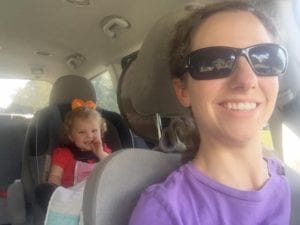When I was younger, it would not be uncommon for my parents to pack all four of us kids into the back seat of the van and “go driving.” We had no idea where we were going, and it would often occupy an entire Sunday–a day when we could’ve been playing with our toys or friends, when we could’ve been at a birthday party for a classmate, or when we could’ve been occupied in a video game! Instead, there we were, driving through the backroads of Mississippi, scoping out potential sites to go camping. The picture of boredom, right? And if we built up the courage to ask where we were going, the inevitable reply was “crazy.” Indeed, we felt like we were.
It was clear to us then that this was Mom and Dad’s trip, and we were merely along for the ride.

However, we made no complaints. We knew our parents didn’t care that we were “bored,” and any complaints would have been unheard and futile. In fact, it was the very culture of our family that our parents put each other and their desires first. We did not live in a child-centric home.
For example, we took it for granted that if one of our “plans” interfered with a family occasion–no matter how dreadful–we had to go to the family event. If our parents really wanted to vacation in the mountains, despite the fact that we wanted a change of scenery and maybe an amusement park or two, it made no difference: this was their vacation, and we were along for the ride (and all the antiquing stops along the way). We took a back seat without complaint because we knew no better.
I don’t remember my parents ever asking us where we’d like to go for dinner or how we’d like to spend our Saturday. I’m certain that they weren’t interested in our idealized vacations or that we’d really rather go over to a friend’s house instead of Granny’s.
I never thought anything of it until I became a parent and saw how child-centric parenting has become. I hear people all the time asking their children what they would like to do, where they would like to go, or–even worse–permission to do something. It’s tempting, and I’ve caught myself doing it.


Sometimes I notify my kids of necessary plans and errands, but I make it sound as if they have a say-so in it: “We’re going to the store before we get lunch, ok?” No, we just are. Deal with it. Sometimes my husband and I allow our kids to help end the debate of where to go for dinner when we can’t decide. We often go to the kids as a third-party vote. But we need to stop. I’m afraid it gives them the illusion of having a parent level of control. And they don’t.
When I think of all of those Sunday afternoons in the back seat, I realize that my parents had it right. Our home and our family culture were about them, and we were simply along for the ride. On that ride, we never missed a meal, were never deprived of exciting experiences, went on innumerable vacations (even a two-week excursion driving to California and across 8 states), made incredible memories, and had full, happy childhoods. This was all because of what they planned, not what we demanded. We were a lot better off for that mentality, and we didn’t even know it.
While it may be a bit jarring for such egocentric little people to learn, my kids need to know that they’re not the center of our family universe–or any other. This thing called life that my husband and I are building together isn’t about them. They’re a wonderful part of it–a part that we lovingly chose and welcomed–but they aren’t the entirety.
So buckle up, kiddos, because it’s going to be a long ride, and you’re in the back seat.

















